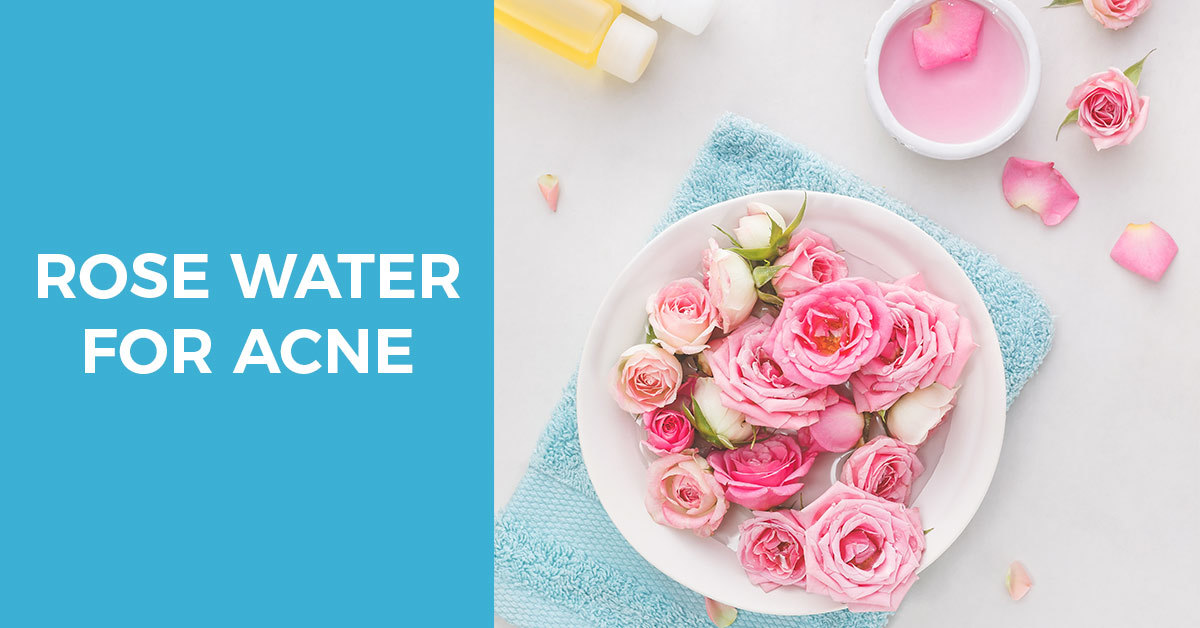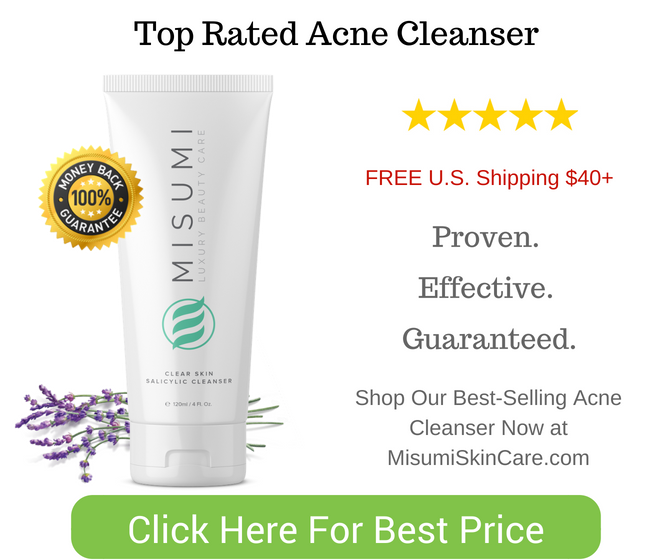Contents
Rose water is a gentle product that has many beneficial uses, if you’re wanting to try it and suffer from acne-prone skin, it’s unlikely to cause any harm.
This article goes over the uses of rose water for acne, how to use on the skin & the beneficial properties it has as a natural remedy.
Rose water is a liquid that is made by steeping rose petals in water, it’s been used for many years throughout Asia and Europe for cosmetic, religious, and medical preparations.
It has five main properties that support its use in treating acne –
- It’s antiseptic & antibacterial.
- It’s known for its antioxidant properties.
- It’s an anti-inflammatory – it’s anti-inflammatory has been really beneficial for acne sufferers as this can really soothe irritation.
- It’s an astringent.
- It sorts out the pH balance.
Main ingredient – Rose petals.
Read more on each of the properties of rose water and how it may be beneficial towards acne and other skin conditions.
Potential benefits of rose water
Overall can be used on all skin types and is known to aid skin irritation leaving a more natural glow to the skin and glowing skin is certainly a win-win for everyone.
Antibacterial properties –
Its antiseptic properties can help treat and prevent breakouts. It has been known that rose oil is a highly effective anti-bacterial, killing one main acne-causing bacteria (Propionibacterium acnes)
Antioxidant properties –
Oil and dead skin cells that build up on inflamed skin can starve the pore of oxygen by creating clogged pores, which makes a perfect home for bacteria.
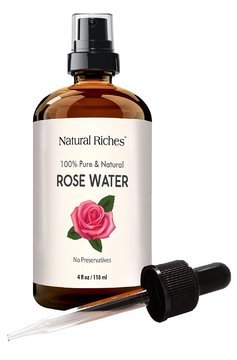
Antioxidants such as rose water can limit the build-up of blocked pores. Free radicals can mess with our skin so antioxidants can also help neutralize and repair skin. Lavender oil can be used alongside rosewater for a really effective anti-oxidant.
Dead skin cells –
Acne occurs when the hair follicle becomes clogged by skin cells and excess oil, which can be worse in oily skin. Be sure to exfoliate within your skincare routine to keep skin clear. Exfoliation can also brighten dull skin, the amount you exfoliate all depends on your skin type, there’s a product that suits all skin types just be sure to be using it correctly.
Anti-inflammatory properties –
The anti-inflammatory properties can help prevent swelling or additional swelling, reduce redness in irritated skin and soothe the overall discomfort of acne which can cause sensitive skin.
Astringent properties –
Generally used to dry out excess sebum (oil) while helping with sebum production, cleanses the skin, and minimizes pores. It isn’t as drying as some other alcohol-based skincare products. Always be aware when using astringents as they are irritating for the skin, you should always check with a professional to make sure you’re using the correct one for your skin. Water-based solutions work best such as witch hazel that can work in hand with rose water.
Both witch hazel and rose water have been used for years in medicine and used as topical agents in skincare. You can combine rosewater and witch hazel and use it as a facial toner.
pH Balance –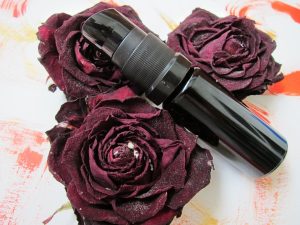
High pH levels can cause the skin to dry out, rose water is 5.5 so balances the skin out, minimizing irritation. Maintaining the correct pH level is essential to minimizing problems with acne and various other skin problems including dry skin & more oily skin.
Anti-aging –
Rose water is found in quite a few beauty products aimed for the more mature skin-helping with fine lines and wrinkles. Anti-aging products can be used for other skin types too as part of a balanced skincare routine.
Antimicrobial –
Some say rosewater has the ability to kill or stop microbes. Rose extract has been effective to do just this.
Remove excess oil –
Dampen a cotton pad or cotton ball with pure rose water and wipe gently over the skin, this can lift excess oil and dirt that remains after cleansing.
Use rosewater toner as it’s an excellent natural toner and not as drying like most other toners. If you use rose water toner it will help prevent acne forming.
Reducing swelling & tired eyes –
Get two cotton pads and wet them with rose water, the more chilled the product the better for this method. Place them gently over the eyes (keep eyes closed) and leave for around 10 minutes – the natural products will soothe the eyes and reduce swelling.
Hydration & pH –
Fill a spray bottle with rose water and use it as a spritz, the natural ingredients help with hydration and restore the pH levels.
If you have been combatting acne for some time already, you know that scars are pesky and difficult to treat consequence of pimples and blackheads. In fact, they are much more stubborn and almost impossible to get rid of.
Fuller’s earth and rose water for acne scars –
Fuller’s earth has a few beauty benefits, it helps in the removal of excess oils and impurities. The healing abilities in it can lighten the appearance of scarring.
Mix the required amount with rose water, until it makes a smooth paste.
Apply on the acne-affected area allowing t to dry naturally for about 15 to 20 minutes.
You can also apply as a spot treatment.
Wash off with Luke warm water.
Also, consider creating a tonic that features equal parts rosewater and freshly squeezed lemon juice.
Lemon juice is an excellent source of vitamin C – one of the most potent natural skin whitening substances. it can lighten the appearance of scars and marks. Just apply this tonic to the skin for 15 minutes, wash and pat dry.
Warning: Lemon juice increases the photosensitivity of the skin and it can increase the negative effects of UV rays. Thus, it’s very important to apply sunscreen to the face after you’ve been using a skin lightening treatment that’s based on vitamin C.
What do People have to Say about Rose Water?
Rose water facial toners have predominantly positive customer reviews. The following illustration will give you a better idea of what people have to say:
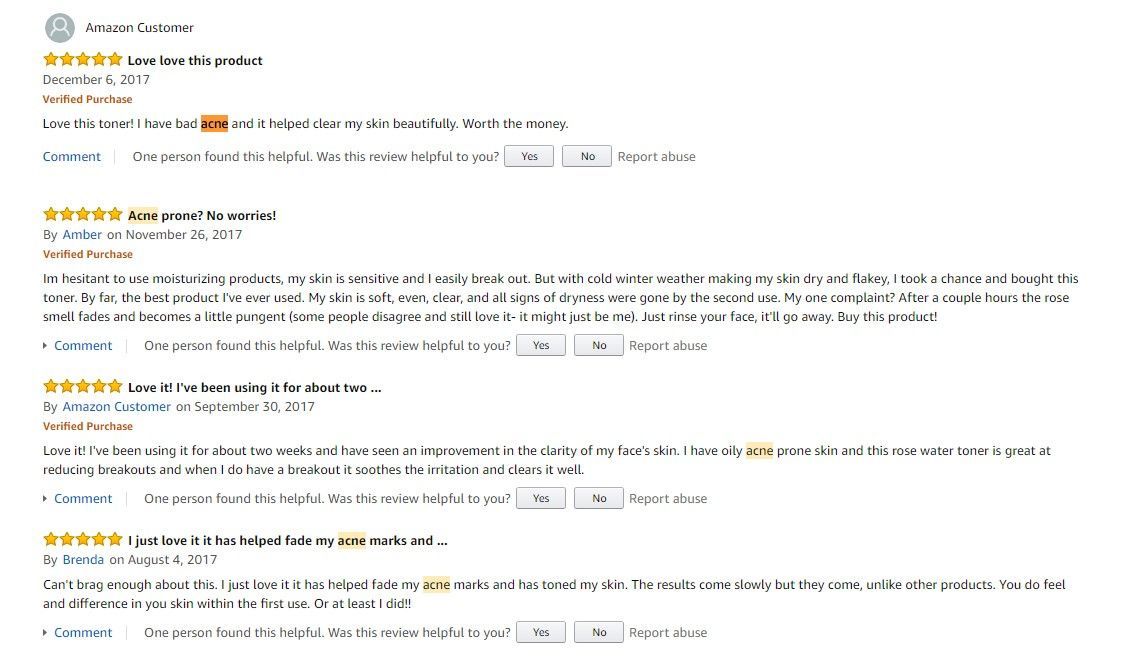
The general consensus is that skin toning with rose water has cleansing, astringent and anti-bacterial properties. At the same time, you will not experience the drying effect that’s common with pharmaceutical products – something you may want to consider for sensitive or dry skin that’s still acne-prone.
Final Verdict
Rose water is very refreshing and kills bacteria while providing the skin with much-needed moisture. Because of this effect, it is gentle when it comes to addressing problems like pimples and blackheads.
People who suffer from severe, stubborn acne will not see a massive improvement right from the start. Rather, they may want to opt for a pharmaceutical product that’s suggested by a dermatologist. In such instances, rose water will be a great addition to the treatment after a thorough cleanse, especially if it’s used as a natural toner and astringent.
Rose water is gentle enough to be used multiple times per day without causing problems and can be used as cleansing water. It will even out the skin tone and reduce the prominence of large pores. The water can also diminish the redness and irritation that are common with acne.
This, however, isn’t a universal or a miraculous solution. You will need to find high-quality rose water, you’ll need to build a good skincare routine and stick to it over the course of several months to see the best possible results.
Natural oils and products are more gentle on the skin as opposed to more synthetic oils such as hyaluronic acid, more natural ingredients have been effective with the skin’s healing process too.
While trying a natural skin care product may be a good idea, you need to talk to a doctor before getting started. Acne could be indicative of another medical problem. A few basic tests will have to be run to exclude other possibilities. If you’re not suffering from a medical issue, you can go ahead to make your skin stronger and healthier through the use of rose water.
Have you tried a rose water acne treatment in the past? Were you happy with the results? Don’t hesitate to share your experience with us. Alternatively, you may want to check out our other natural acne treatment guides to explore alternative possibilities.

